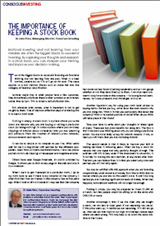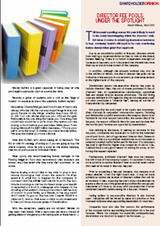|
One of the things
that I emphasize to all the new subscribers of Conscious
investor is to start a stock book. It is an activity
that is just as important for all investors. Putting
it simply, a stock book is a place where you write
down the reasons why you are buying or selling a
particular stock (or doing nothing). It is also
a place where you can keep clippings of articles
about companies that you are watching and printouts
from the internet of relevant press releases, announcements
and reports.
It can be as simple
or as complex as you like. What works well for me
is a ring binder with sections for the different
companies. Apart from printouts mentioned above,
I also use plastic pockets to include clippings
of newspaper and magazine articles.
|
|
|
When I start to get interested
in a particular stock, I go to my stock book to see if
there is any material on the company. I often find that
I had an interest in the company four or five years ago.
When I look at this old material I may see that the company
had made various forward looking statements and so I can
gauge whether or not they have lived up to them. I can
also read comments I may have made on the company —
its strengths and weaknesses, its future prospects and
challenges, and so on.
Another important way for
using your stock book relates to buying stocks. Before
you buy, write down the main reasons why you are doing
this. What is it that you particularly like about the
company? What is its market position or niche? What do
you think will take place in the future?
Take your time to write
down your thoughts in these types of areas. There are
two main benefits for doing this. The first is that it
sharpens your thinking about why you are taking a particular
action. You are more likely to buy for rational reasons.
If not, at least you will know that you are not being
rational.
The second reason is that
it helps to improve your skill in making decisions in
following years. Often we buy a stock for reasons that
are vague and only partially thought through. The problem
with this is that, even if the investment is successful,
it is no help for making the next decision, or any others
after that. The best you can deduce from it is that you
were lucky once and perhaps you will be lucky again.
You may be satisfied with
this approach when you are investing comparatively small
amounts of money. But I like to think that no matter where
you are now on the wealth scale, it won't be long before
you are investing significant amounts of money. When that
happens, lackadaisical methods will no longer be enough.
Putting it simply, you may
be prepared to invest $1,000 on a hunch, but few people
would be willing to do the same with $100,000 or more.
Another advantage is that
if we are clear why we bought a stock, we can test in
later years if our reasoning was sound. If the price went
up, it reinforces our reasoning. If it did not go up,
then we can look back at our logic and perhaps locate
steps where we went wrong. This may help us to avoid the
same mistake in the future.
Warren Buffett is a great
supporter of being clear why you bought a particular stock
at a particular time.
Recently a group of students
paid a visit to the "Sage of Omaha". In response
to one of the questions, Buffett replied:
Note that Buffett talks about
buying all of Microsoft. This fits in with his strategy
of acting as if you are going to buy the whole company.
Once he puts a price on the entire company, then he can
put a price on individual shares.





